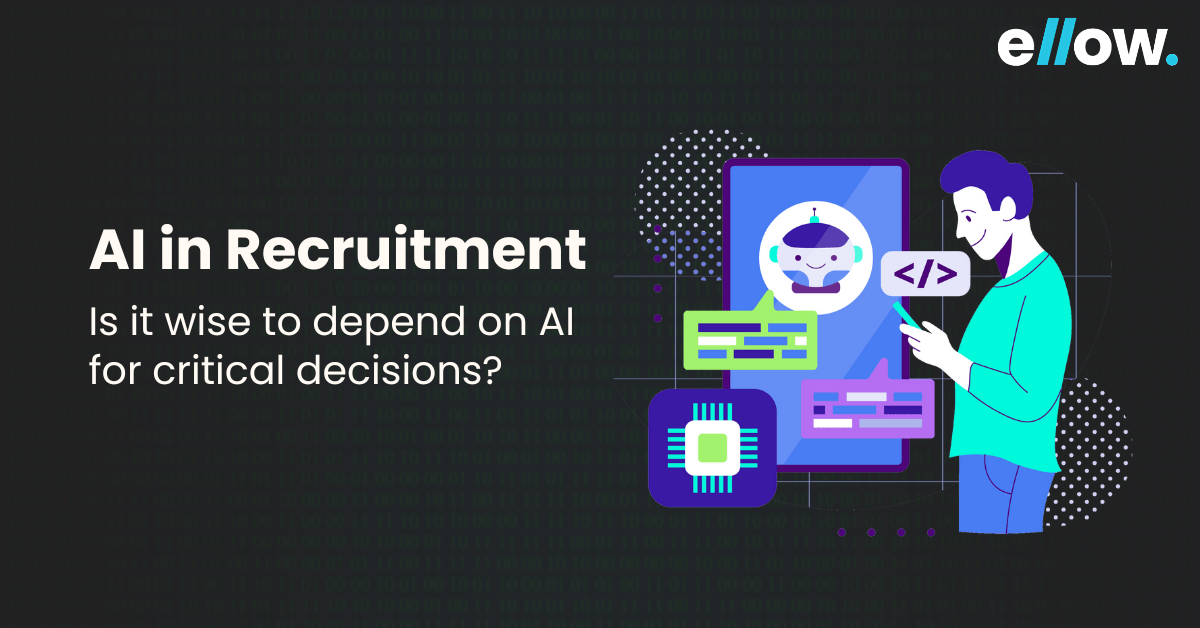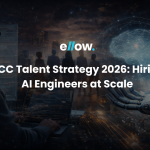Let’s build the future together.
Great ideas need great people. Partner with us to bring your vision to life, or take the first step in your career by joining our team of innovators.

As technology advances, its integration into various industries sparks both curiosity and concern. One such field is recruitment.
In recent times, discussions surrounding the role of artificial intelligence (AI) in recruitment have gained traction. The questions that arise are,
Can AI effectively replace human judgment in hiring processes?
Is it prudent to rely on AI for such critical decisions?
Recruitment encompasses diverse tasks, ranging from data analysis to interpersonal assessment.
While human intuition and experience are invaluable, AI presents an opportunity to streamline and augment these processes. Leveraging AI tools in recruitment promises increased efficiency, reduced errors, and expedited decision-making.
In this comprehensive guide, we will look into AI in recruitment, exploring its potential benefits, ethical considerations, and best practices. Whether you’re a hiring manager seeking to optimize your processes or an individual navigating the job market, understanding the role of AI in recruitment is essential in today’s evolving landscape.
In 2023, the primary application of AI in the recruiting process in North America centered around chatbots and intelligent messaging. A significant 41 percent indicated that their foremost use of AI was for job recommendations on career sites.
AI for recruitment refers to the use of artificial intelligence in the process of finding and hiring new employees. It involves using technologies like machine learning to analyze data and automate various tasks involved in recruitment.
One of the key aspects of AI in recruitment is its ability to sift through large volumes of resumes or job applications to identify the most suitable candidates based on predefined criteria.
This helps to save time and resources for recruiters by eliminating the need to manually review each application.
AI recruitment tools can also help in identifying potential biases in job descriptions or candidate selection processes, thus promoting diversity and inclusion in hiring practices.
Overall, AI for recruitment aims to streamline and optimize the hiring process, making it more efficient and effective for both recruiters and job seekers.
Recruitment often involves tedious tasks like reviewing resumes and scheduling interviews, consuming valuable time.
According to the Workable AI in Hiring Survey 2024, around 44.2% of respondents have observed a considerable speed-up in their hiring processes thanks to AI.
This reflects AI’s substantial role in optimizing recruitment workflows and decreasing the overall time it takes to hire new talent.
By employing AI-driven tools, organizations can rapidly assess vast pools of applications to identify suitable candidates efficiently. This automation allows HR departments to allocate their efforts towards more strategic tasks, thereby advancing the broader objectives of their organizations.
Human biases in hiring decisions can lead to unfair practices and undermine efforts to foster diversity.
A survey by Tidio indicates that 68% of recruiters are optimistic that AI can eliminate these unintentional biases. By objectively evaluating candidates based on skills and experience, AI introduces a level of impartiality to the screening process, thereby reducing biases associated with factors like age, gender, or ethnicity.
A cumbersome recruitment process can deter potential hires and tarnish an employer’s reputation. By leveraging AI tools, recruiters can streamline applications, making the process more engaging and personalized for candidates, thereby enhancing the overall candidate experience and boosting the employer brand.
Making a poor hiring decision can be costly for businesses in terms of productivity and financial resources. AI-powered recruiting solutions can provide data-driven insights to help identify the best candidates, ultimately leading to higher-quality hires and reducing the risk of costly mistakes.
Let’s explore how AI can be utilized in different stages of recruitment:
According to LinkedIn, 72% of recruiters acknowledge the significant benefits of AI in candidate sourcing.
These AI-based sourcing tools leverage sophisticated algorithms and machine learning techniques to streamline the process of identifying and engaging suitable candidates.
By meticulously scanning job boards, internal databases, and various social media platforms, these tools pinpoint potential candidates for specific roles with remarkable efficiency.
This automation not only minimizes the manual workload but also equips recruiters with data-driven insights and tailored recommendations, facilitating more informed decision-making.
As a result, recruiters can effectively reach out to the most pertinent candidates, enhancing both the speed and accuracy of the sourcing process.
Overall, AI sourcing tools enhance the candidate sourcing process, making it quicker, and more accurate, and enabling recruiters to focus on building relationships with potential hires.
AI screening tools automate the process of analyzing job applications, saving time and effort for recruiters. These tools use algorithms to extract key information from resumes, such as skills and experience, and evaluate candidates based on predefined criteria.
By analyzing behavioral patterns and red flags, AI helps identify qualified candidates more efficiently.
Recruiters can then focus their attention on candidates who are the best fit for the role, improving the overall quality of hires.
AI screening tools streamline the candidate selection process, allowing recruiters to make faster and more informed decisions while reducing the risk of overlooking potential candidates.
AI-powered talent assessment tools use technology like gamification, behavioral evaluations, and skill testing to thoroughly analyze candidates.
These tools provide detailed reports on candidates’ strengths, weaknesses, and personality traits. By leveraging machine learning algorithms, they offer a comprehensive understanding of each candidate’s potential fit for the role.
This saves time and resources for organizations while offering candidates an engaging and interactive assessment experience.
With customizable features and integration capabilities, these tools align with the specific needs of each organization, contributing to a more efficient and effective talent acquisition process.
AI-enabled interview platforms streamline the hiring process by conducting initial interviews through video calls and text-based interactions. These platforms analyze candidates’ tone, facial expressions, and answers using machine learning algorithms.
Recruiters receive insights into candidates’ suitability for the role based on their demeanor and responses. This helps save time and effort by identifying promising candidates early in the process.
Additionally, the platforms provide data on candidates’ performance, such as response time and engagement level, aiding recruiters in making informed decisions.
Overall, AI-powered interviews improve efficiency and accuracy in candidate evaluation, enhancing the hiring experience for both recruiters and candidates.
AI-based solutions for offer and onboarding streamline the process of introducing new hires to the organization’s culture and procedures.
These tools use machine learning to tailor the onboarding experience to each employee’s needs, ensuring a smooth transition into their new role.
By automating administrative tasks and providing personalized guidance, AI helps HR teams create a positive and engaging onboarding journey. This not only saves time and resources but also enhances employee satisfaction and productivity.
Ultimately, prioritizing a welcoming and efficient onboarding process sets the stage for successful long-term relationships between employees and their organization.
Using AI for recruiting helps save time by automating repetitive tasks like screening resumes and scheduling interviews. These tasks can be time-consuming for recruiters, taking up valuable hours that could be spent on other important aspects of their job.
With AI, these processes are streamlined, allowing recruiters to focus their time and energy on tasks that require a human touch, such as building relationships with candidates and assessing cultural fit.
Overall, AI automation helps recruiters work more efficiently and effectively, ultimately leading to a faster and smoother recruitment process.
Using AI for recruitment improves the quality of hires by matching candidates’ skills and experience with job requirements. This means that recruiters can find candidates who are better suited for the role, resulting in happier and more productive employees.
By analyzing data, AI ensures a more objective and standardized approach to candidate selection, reducing the likelihood of turnover.
Companies adopting AI-powered recruiting software have seen significant improvements in their cost per hire, revenue per employee, and turnover rates.
Overall, AI enables recruiters to make more informed hiring decisions, leading to better outcomes for both the company and the candidates.
With AI, candidates experience clear, efficient processes and receive personalized communication. This makes them feel valued and respected, leading to higher satisfaction levels.
By automating tasks like scheduling interviews and providing prompt responses, AI ensures candidates stay engaged and informed throughout their journey.
Additionally, AI can tailor content and recommendations based on candidates’ backgrounds and preferences, further enhancing their experience.
Overall, AI contributes to a positive candidate experience, fostering goodwill towards the organization and increasing the likelihood of successful hires.
With AI taking over tasks like resume screening and interview scheduling, recruiters can focus on more strategic aspects of their job, such as building relationships with candidates and stakeholders.
This shift in focus allows recruiters to work more efficiently, leading to increased productivity overall. By leveraging AI to streamline their workflow, recruiters can accomplish more in less time, ultimately contributing to the success of their recruitment efforts and the organization as a whole.
Using AI for recruiting reduces costs by automating repetitive tasks, such as resume screening and interview scheduling, which minimizes the need for manual labor. This automation leads to significant savings in hiring costs for organizations.
By streamlining processes and increasing efficiency, AI helps cut down on unnecessary expenses associated with the recruitment process.
Moreover, the use of AI eliminates human errors and reduces the likelihood of costly mistakes in candidate selection. Overall, the cost reduction achieved through AI implementation enables organizations to allocate resources more effectively and invest in other areas of their business for further growth and success.
AI-powered tools make it easier for companies to handle a large number of job applicants efficiently. These tools can process and screen candidates at a much faster rate than manual methods, allowing recruiters to manage high volumes of applications without sacrificing quality.
This scalability is especially beneficial during periods of increased hiring or when expanding operations.
By automating repetitive tasks and streamlining workflows, AI enables organizations to adapt to changing recruitment needs and grow their talent pool without overburdening their recruiting teams.
Overall, scalability ensures that companies can efficiently manage recruitment processes regardless of the volume of applicants.
AI systems in recruiting continuously learn from past interactions and outcomes, allowing them to get better over time.
By analyzing data on candidate responses, hiring outcomes, and recruitment processes, AI algorithms can identify patterns and trends. This enables them to make more accurate predictions and recommendations for future hiring decisions.
As a result, recruiters benefit from increasingly refined tools that enhance efficiency and effectiveness.
This continuous improvement cycle ensures that AI-powered recruitment solutions stay up-to-date and relevant, providing ongoing value to organizations seeking top talent.
AI technology can analyze a candidate’s background, skills, and interests to offer them job opportunities that match their profile. For example, if a candidate has experience in marketing, the AI system may suggest marketing roles that align with their expertise.
By offering tailored recommendations, AI enhances the candidate experience, making them feel valued and understood by the hiring organization.
This personalization also increases the likelihood of candidates engaging with job opportunities that are relevant to their career goals and aspirations.
By spotting patterns indicating potential retention issues, organizations can take proactive steps to enhance employee satisfaction and reduce turnover.
This means identifying factors like job satisfaction, work-life balance, or career growth opportunities. With AI’s help, companies can address these concerns before they lead to turnover, ultimately fostering a more stable and satisfied workforce.
This benefits both employees, who feel valued and supported, and organizations, which can avoid the costs and disruptions associated with frequent turnover.
By centralizing information and communication, these systems ensure all stakeholders, such as hiring managers and recruiters, stay informed and engaged throughout the process.
This leads to better collaboration and alignment, as everyone has access to the same data and can provide input effectively.
Additionally, AI tools facilitate smooth communication and coordination, reducing misunderstandings and delays. Ultimately, improved teamwork results in more efficient and successful hiring outcomes, benefiting both the organization and the candidates involved.
By collecting and analyzing data, AI can identify trends, patterns, and insights that help recruiters make informed decisions. This includes tracking metrics such as candidate sourcing channels, time-to-hire, and candidate engagement, enabling recruiters to optimize their strategies.
Additionally, AI ensures compliance with hiring regulations and policies by flagging potential issues and ensuring fair and consistent practices.
Overall, AI-driven data analysis enhances the effectiveness and efficiency of recruitment processes, helping organizations make better-informed decisions while staying compliant with regulations.
Utilizing intelligent screening software streamlines the resume screening process by employing AI, such as machine learning algorithms, to analyze existing resume databases.
This software learns from the success and failure of past candidates, enabling it to automatically rank, grade, and shortlist potential candidates based on their skills, experience, and other relevant factors.
Additionally, it can enrich candidate profiles by gathering information from public sources like social media platforms.
Recruiter chatbots are AI-powered tools designed to engage with candidates in real time, providing them with updates, feedback, and guidance throughout the application process.
These chatbots ask relevant questions based on job requirements and can significantly enhance the candidate experience by ensuring consistent communication and support.
Research shows that regular updates from employers during the application process positively impact candidates’ perceptions of a company.
Digitized interview platforms leverage AI to assess candidates’ suitability for a role by analyzing their word choice, speech patterns, and facial expressions during online interviews. This technology goes beyond traditional video conferencing tools, providing recruiters with valuable insights into candidates’ potential fit for both the role and the organization’s culture.
Experts in the field predict that the future of recruiting will be heavily influenced by Augmented Intelligence (AI), rather than full automation. Augmented Intelligence is a concept that acknowledges the importance of human skills in conjunction with technology.
Instead of replacing humans, AI is seen as a tool to enhance human capabilities and efficiency. According to Michael Haberman, an HR Consultant, using AI to augment human efforts may be the most beneficial approach for HR.
One significant change brought about by AI in recruiting is the automation of repetitive administrative tasks. This automation will have three main effects on the recruiter role:
Indigo faced the challenge of handling a large volume of applications, with over 2,200 coming in weekly. To streamline their hiring process, they implemented AI for CV screening.
This move led to a significant reduction in recruitment costs by 75%, along with a 71% decrease in cost per hire. Moreover, they experienced a threefold increase in qualified candidates and nearly quadrupled their recruitment efficiency.
With a yearly recruitment goal of hiring over 6,000 employees, Intuit’s VP of Talent Acquisition, Nick Mailey, turned to AI to improve candidate selection.
By leveraging AI to score and prioritize candidates based on the profiles of the company’s top performers, he noticed a remarkable improvement in candidate quality and time-to-hire rates.
The time taken to hire from the prioritized candidate list was reduced to under 30 days, a significant improvement from the previous 62 days.
Vodafone sought to enhance the efficiency of its interviewing process by incorporating AI-based software for video interviews. Candidates were required to record themselves answering a set of standardized questions, which were then assessed by the AI program.
Factors such as body language, facial cues, and speech cadence were analyzed to determine candidate suitability.
This approach has facilitated over 50,000 video interviews and halved Vodafone’s hiring time, making the process more efficient and effective.
AI has emerged as a valuable tool in the recruiting process, offering benefits such as time-saving automation and improved quality of hire. However, it also presents challenges like the need for ample data and the potential for bias.
Despite these challenges, innovations like intelligent screening software and recruiter chatbots show promise in transforming the recruitment landscape.
Moving forward, AI is poised to change the recruiter role by enabling more proactive hiring and enhancing relationships with hiring managers through data-driven insights. For further information on your hiring process, contact ellow.io for assistance.
AI in recruitment refers to the use of artificial intelligence technology to streamline and automate various aspects of the hiring process, such as resume screening, candidate engagement, and interview scheduling.
Using AI in recruitment offers benefits such as saving time for recruiters by automating repetitive tasks, improving the quality of hire through better job matching, and providing valuable insights for strategic decision-making.
Examples of AI applications in recruitment include intelligent screening software for automated resume screening, recruiter chatbots for engaging candidates in real-time conversations, and digitized interviews for assessing a candidate’s fit.
Some challenges of implementing AI in recruitment include the need for extensive data to train AI models, the risk of perpetuating human biases in algorithms, and the skepticism of HR professionals towards new technology.
AI is expected to change the role of recruiters by enabling them to be more proactive in their hiring approach, assisting in determining candidates’ cultural fit, and improving relationships with hiring managers through data-driven insights and performance metrics.

Top 10 Countries to Hire Remote Developers (and Why)

GCC Talent Strategy 2026: Hiring AI Engineers at Scale

GCC vs Outsourcing vs Remote Teams: What Works in 2026
Please feel free to share your thoughts and we can discuss it over a cup of tea.
Get a quote
Six Things to Consider When Hiring Remote Talent

ellow.io enters remote hires market with AI-based screening process

Future of Talent is Remote and without Borders